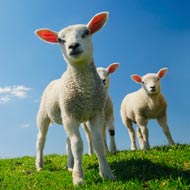
Online service is giving farmers more confidence
Online forecast maps that warn sheep farmers of the risk of Nematodirosis are resulting in fewer lamb deaths and less scouring, according to the University of Bristol.
Launched in 2013, the online risk forecast was developed to predict when Nematodirus eggs will hatch and when outbreaks are likely to happen.
Developed by SCOPS (Sustainable Control of Parasite in Sheep) and researchers at the University of Bristol, the forecast maps are updated every day to record changes in risk. They also include treatment and management advice, allowing farmers to take action before it is too late.
Commenting on the success of the maps, Dr Hannah Rose, senior research associate at the University of Bristol, said: “Farmers using the forecast service in 2016 reported significant improvements in lamb health including fewer lamb deaths, less scouring (diarrhoea) better weight gain and better body lamb condition.”
A farmer who used the forecast in 2016 added: “The interactive map means that I have greater confidence about when it is safe to move the lambs and avoid risk of Nematodirus.”
The Nematodirus parasite is a deadly threat to lambing flocks. Eggs deposited on pasture by lambs the previous year hatch in Spring, triggered by the rise in temperature. As they graze, young lambs take in the eggs, which damage their gut, leading to black scour and death.
Taking advantage of the temperature-driven hatching of the Nematodirus larvae, the online forecast uses data from 140 weather stations provided by the Met Office and Forecast.io. The interactive Google map allows farmers and advisers to select the nearest or most representative weather station and gives advice on how to relate the predicted risk to their particular farm and treatment options.
According to the University of Bristol, more than 60 per cent of farmers surveyed changed the timing or extent of treatment after consulting the forecast. Ninety-three per cent of those surveyed felt that their approach to control of this parasite had changed as a result of the forecast, they added.



 The latest
The latest